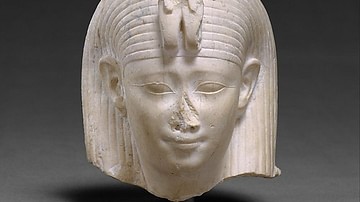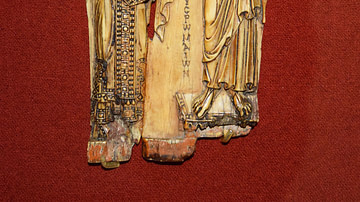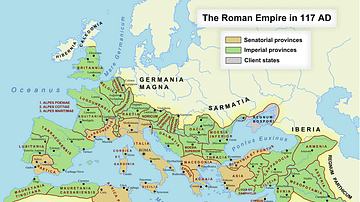Search
Search Results

Definition
Seleucus I Nicator
Seleucus I Nicator (l. c. 358-281 BCE, r. 305-281 BCE) was one of the generals of Alexander the Great (l. 356-323 BCE) who made up the group of Diadochi ("successors") who divided the vast Macedonian Empire between them after the death of...

Definition
Thessalonica
Thessalonica (also Thessalonike) was an ancient city of Macedon in northern Greece which today is the city of Thessaloniki. Made capital of the Roman province of Macedon, the city flourished due to its location on the major trade route to...

Definition
Amphictyonic League
The Amphictyonic League was an early form of religious council in ancient Greece. It was typically composed of delegates from several tribes or ethnes living in the vicinity of a major, prosperous sanctuary, who then collaborated in supervising...

Definition
Arsinoe II Philadelphus
Arsinoe II (l. c. 318/311 - c. 270/268 BCE), daughter of Ptolemy I became one of the most enduring figures of the Lagid or Ptolemaic Dynasty and left an undeniable mark in the historical evidence. She was married three times; first to Alexander...

Definition
Thessalonike of Macedon
Thessalonike of Macedon (c. 345-295 BCE) was the daughter of Philip II of Macedon (r. 359-336 BCE) and one of his several consorts, Nikesipolis of Pherae (also spelt Nicesipolis). Born to the Argead family of Macedonian rulers like her half-brother...

Definition
Amastris
Amastris (c. 340/39-285 BCE) was a niece of the Persian king Darius III (r. 336-330 BCE) through her father Oxyathres. She was married in succession to Alexander's general Craterus, the tyrant Dionysius of Heraclea, and finally to Lysimachus...

Definition
Phocion
Phocion (c. 402 – 318 BCE) was an Athenian statesman and military commander who, according to tradition, was made a general a staggering 45 times. A student of Plato and known as 'the Good', his political position was somewhat ambiguous...

Definition
Cleopatra VII
Cleopatra VII (l. c. 69-30 BCE, r. 51-30 BCE) was the last ruler of Egypt before it was annexed as a province of Rome. Although arguably the most famous Egyptian queen, Cleopatra was actually Greek and a member of the Ptolemaic Dynasty (323-30...

Definition
Constantine VII
Constantine VII was Byzantine emperor from 945 until 959 CE. Sometimes known as Constantine Porphyrogennetos because of his birth in the purple chamber of the royal palace, he was served by various regents from 912 CE until reigning in his...

Article
The Extent of the Roman Empire
Time has seen the rise and fall of a number of great empires - the Babylonian, the Assyrian, the Egyptian, and lastly, the Persian. Regardless of the size or skill of their army or the capabilities of their leaders, all of these empires fell...